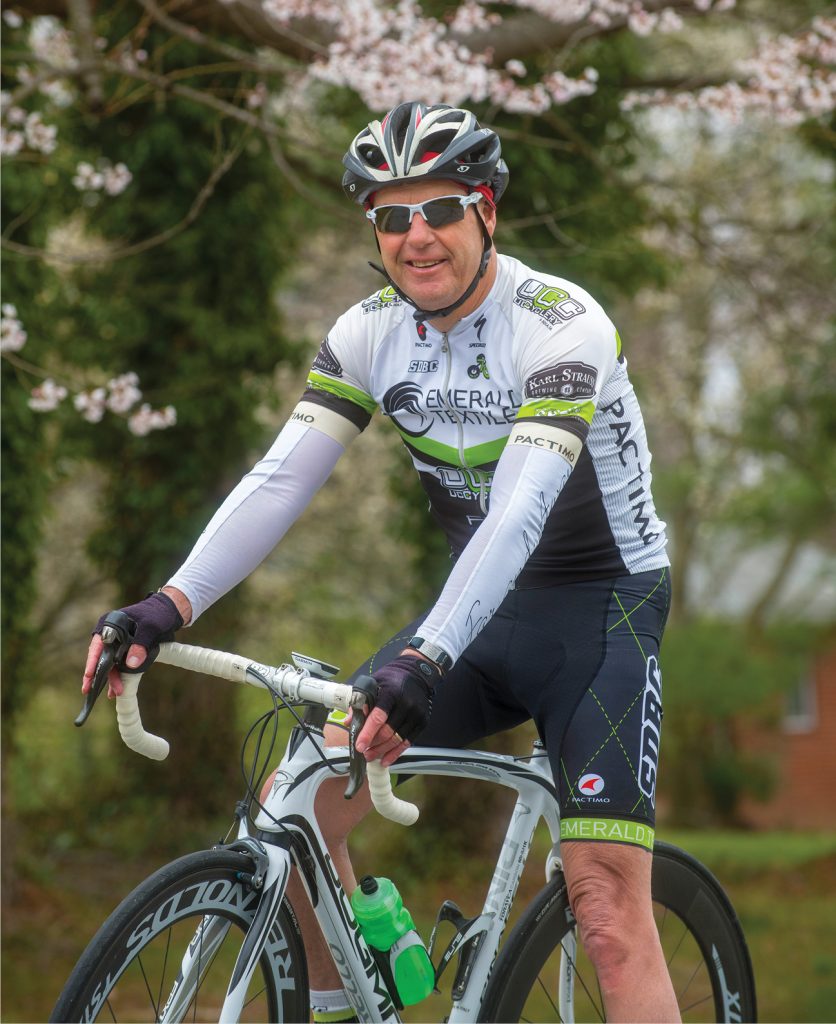Jeffrey Boarman, age 62, isn’t accustomed to detours. The Olney, Maryland, resident typically cycles five times a week. He enjoys 20- to 50-mile rides through the Maryland countryside and around San Diego, California, where he and his wife, Alice, have a second home near their grown children. He’s also a member of two cycling clubs.
Last July, Jeffrey developed a nagging soreness in his throat, “like someone was pricking it with a stick,” he recalls. But he was too focused on his son’s upcoming wedding and his cycling to give it much thought. That changed when he began to cough up blood during an overnight st

op on a drive back to Maryland from San Diego. As soon as he arrived home, Jeffrey headed for tests at MedStar Montgomery Medical Center.
A CT scan revealed inflammation at the base of Jeffrey’s tongue. “When a biopsy
confirmed stage I HPV-positive throat cancer, I was shocked. I’m healthy and I don’t drink alcohol or smoke cigarettes,” he says.
While smoking and heavy drinking are major risk factors for head and neck cancer, according to Luther L. Ampey III, MD, the human papilloma virus (HPV) accounts for 70 to 80 percent of oropharyngeal (throat) cancers. HPV-positive throat cancer typically develops at the base of the tongue, the back of the throat, or around the tonsils.
“For non-smokers like Jeffrey, HPV-positive throat cancer has an excellent prognosis, especially at early stages, because it responds better to treatment than non-HPV-positive throat cancer,” says Dr. Ampey, a radiation oncologist and medical director at the Helen P. Denit Center for Radiation Therapy at MedStar Montgomery.
Dr. Ampey and his team carefully mapped out Jeffrey’s treatment plan for six weeks of radiation therapy. “Dr. Ampey was the first doctor I saw. I loved talking to him. He presented comprehensive information about treatment options for my diagnosis, so I could make informed decisions and follow treatment recommendations,” Jeffrey says.
An educational approach is key to successful patient care, according to Dr. Ampey.
“My role is to supply as many details as possible about the logistics of radiation therapy, including all potential side effects, so the patient knows what to expect before, during, and after treatment. It’s important to help our patients manage their anxiety about the treatment process. We are part of each patient’s support system,” he explains.
Before Jeffrey’s treatments began, a cycling club friend recommended that he contact a colleague who had also been treated by Dr. Ampey for HPV-positive throat cancer. Hearing about side effects from someone who had experienced them firsthand was helpful.
“For example, he described how painful swallowing would become and mentioned the option of a feeding tube to maintain my weight and get proper nutrition, which became critical issues for me. Knowing these things helped me prepare and recover,” Jeffrey recalls.
For anyone faced with a cancer diagnosis, Jeffrey suggests talking to someone who has gone through similar treatment. Jeffrey also found that his strong relationship with his care team and supportive family and friends made a big difference in his treatment journey.
“My cycling club friends and my wife sent me encouraging notes to lift my spirits,” Jeffrey recalls. “I am also so appreciative of the entire staff in the Radiology Oncology department. Everyone, from the front desk receptionists to the technicians who delivered my treatments, was so upbeat and encouraging and helped me stay positive. On my care team, I have to thank Kaiya Messenger, RN, OCN, who helped me manage my side effects—and of course, Dr. Ampey,” says Jeffrey.
After successful treatment, Jeffrey is back on his bike—and as unstoppable as ever.









